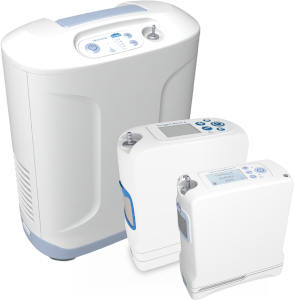Breathing Health Resources
Breathing is a natural thing, so we may be tempted to take it for granted. It’s only when we experience breathing problems that we begin to appreciate how hard our lungs work for us. The truth is that, like the rest of our body, our lungs require daily care and attention to function at their best. Breathing feeds oxygen to the cells throughout your body. Without sufficient oxygen, people are more prone to health problems, including respiratory illnesses, chronic obstructive pulmonary disease, and even heart disease.[1]
Inogen’s purpose is improving lives through respiratory therapy, so we have curated some reliable resources to help you keep your lungs healthy. Read on to learn more about where to find the breathing health information you need.
Tips for Healthy Breathing
- Stay away from tobacco smoke. Cigarette smoking is the major cause of lung cancer and chronic obstructive pulmonary disease (COPD), which includes chronic bronchitis and emphysema. Cigarette smoke can narrow the air passages and make breathing more difficult. It causes chronic inflammation, or swelling in the lung, which can lead to chronic bronchitis. Over time cigarette smoke destroys lung tissue and may trigger changes that grow into cancer. If you smoke, it is never too late to benefit from quitting.[2]
- Minimize exposure to indoor pollutants. Since we spend up to 90% of our time indoors, indoor air quality is an important consideration. It may be surprising to learn that indoor air may be even more polluted than the air outdoors. Avoid second hand smoke, chemicals like pesticides or cleaning products, biological pollutants like mold and dust mites and combustible pollutants used for heating or cooking like wood or oil. Check your home for radon and beware of any toxins that could be released during construction like asbestos, lead or VOCs. Talk to your healthcare provider if you are worried that something in your home, school or workplace may be making you sick.[2]
- Minimize exposure to outdoor air pollution. While it is impossible to completely avoid outdoor pollution, it is possible to reduce your exposure on high pollution days. You may have to contend with smog, which contains ozone and other lung irritating particles. You may also need to be aware of wildfire season, when smoke can make it difficult to breathe and avoid burning wood or trash. Check Airnow.gov to find out the daily air conditions in your area and stay inside when pollution levels are high. If you must go outdoors, limit your activity and consider wearing a mask.[2]
- Stay healthy. Regular check-ups help prevent diseases, even when you are feeling well. This is especially true for lung disease, which sometimes goes undetected until it is serious. Fight potential respiratory infections by avoiding spending time around people who are sick and washing your hands frequently, particularly after spending time in public. Stay up-to-date on your vaccinations, including your yearly flu shot, and if you do get sick, stay home and take care of yourself so you can recover without spreading your infection to others.[2]
Breathing Health Management
While avoiding irritants and staying healthy are important for your breathing health, there are also other steps you can take to maintain your breathing health. Here are some breathing health management techniques to keep your respiratory system as healthy as possible.
- Breathe properly. It is possible to get into bad breathing habits, so work on your breathing techniques to ensure you are breathing as efficiently and effectively as possible. Practice diaphragmatic breathing, which helps you achieve a deeper inhale, and practice slow, deep breathing. Pay attention to your posture, too. The more room you make for your lungs, the better your breathing will be.[1,3]
- Drink plenty of water. Staying hydrated is good for your health all around, but it also helps keep mucus linings thin, which helps the lung function better.[1]
- Stay active. Whether you are young or old, slender or large, able-bodied or living with a chronic illness or disability, being physically active can help keep your lungs healthy.[2] Aim for at least 20 minutes of consistent, moderately intense movement daily, like a brisk walk or a bike ride.[1]
Inogen Curated Breathing Health Resources to Help You
Following breathing health guidelines is good for your overall health, so Inogen has compiled the following breathing health resources to get you started. Talk to your doctor about your breathing health and ask which resources will help you most with your breathing health management.
- American Association for Respiratory Care (AARC): Gain information about Respiratory Care Week, how to learn more about respiratory care and how respiratory therapists can help raise awareness of lung health.
- American Cancer Society: Information about the health risks of secondhand smoke. American Lung Association (ALA): Tips for protecting your lungs and your breathing health.
- Asthma and Allergy Foundation of America: Helpful information about how air pollution affects people with asthma and what you can do to reduce your exposure to a variety of different pollutants.
- Center for Disease Control (CDC): A fact sheet regarding secondhand smoke and how it affects you and your lungs.
- Mayo Clinic: An informative Q and A that reviews how cleaning products can hurt your lungs and affect your breathing health.
- Medical News Today: Helpful tips for cleansing toxins from your lungs to maintain good breathing health.
- National Institute of Health’s National Cancer Institute (NIH): Information about secondhand smoke and how it causes cancer.
If you struggle with your breathing health, talk to your doctor or healthcare team to help you find the breathing health guidelines that are best for you and your respiratory issues. Contact Inogen for information about maintaining your respiratory health.
References
- https://www.rush.edu/news/9-tips-healthy-lungs
- https://www.lung.org/lung-health-diseases/wellness/protecting-your-lungs
- https://www.lung.org/blog/you-might-be-breathing-wrong
Links to Breathing Health Resources
- http://www.aarc.org/resources/programs-projects/respiratory-care-week/
- https://www.cancer.org/healthy/stay-away-from-tobacco/health-risks-of-tobacco/secondhand-smoke.html
- https://www.lung.org/lung-health-diseases/wellness/protecting-your-lungs
- https://www.aafa.org/air-pollution-smog-asthma/
- https://www.cdc.gov/tobacco/basic_information/secondhand_smoke/index.htm
- https://newsnetwork.mayoclinic.org/discussion/mayo-clinic-q-and-a-cleaning-products-and-lung-health/
- https://www.medicalnewstoday.com/articles/324483
- https://www.cancer.gov/about-cancer/causes-prevention/risk/tobacco/second-hand-smoke-fact-sheet







